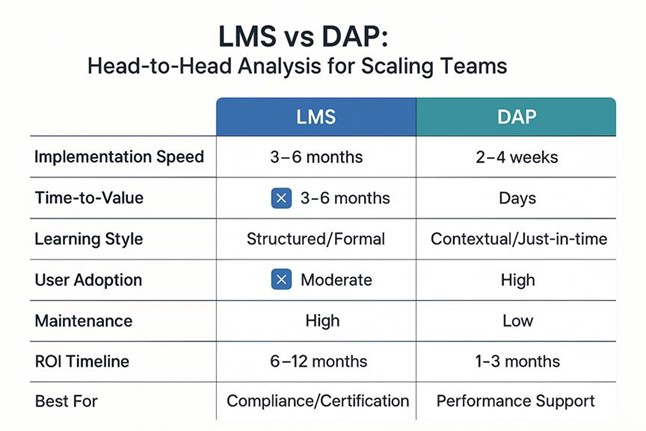Table of Contents
- Executive Summary
- The Training Platform Revolution
- The Scaling Challenge: Why Traditional Training Fails Fast-Growing Teams
- LMS Deep Dive: The Structured Learning Powerhouse
- DAP Deep Dive: The Real-Time Performance Accelerator
- Head-to-Head Comparison: LMS vs DAP for Scaling Teams
- Apty DAP For Business Execution Over Software Adoption
- Making the Right Choice: Decision Framework for Scaling Teams
- Best Practices for Maximum Impact
- Your Next Steps: Transform Your Training Strategy Today
- Key Takeaways
- FAQs
Executive Summary
Training and development are critical for the success of fast-growing companies, but traditional methods are often too slow and ineffective for scaling teams. Digital Adoption Platforms (DAPs) like Apty represent a fundamental shift in how businesses approach employee training and performance support.
Unlike Learning Management Systems (LMS), which typically take months to implement, DAPs provide real-time, in-application guidance that accelerates time-to-productivity and reduces errors, support tickets, and training costs.
This comprehensive guide explores the key differences between LMS and DAP, focusing on their impact on scaling teams, ROI, and business execution. With DAPs offering measurable results within weeks and 3.4x ROI in the first year, forward-thinking companies can transform their training strategies into a competitive advantage.
The Training Platform Revolution
Fast-growing companies that choose the right training platform scale 3.4x faster than those stuck with legacy solutions. This is the difference between explosive growth and stagnant mediocrity.
While your competitors struggle with outdated training approaches that take months to implement and deliver questionable results, forward-thinking leaders are leveraging next-generation platforms that transform their teams’ capabilities in days, not quarters.
The numbers tell an extraordinary story of transformation.
The Digital Adoption Platform market is projected to grow from $2.47 billion in 2024 to $18.13 billion by 2034, representing a staggering 22.52% compound annual growth rate. This is a fundamental shift in how successful organizations approach employee development and performance optimization.

You’re not reading this because you’re satisfied with the status quo. You’re here because you recognize that training and performance support represent either your greatest competitive advantage or your most significant bottleneck.
The organizations that emerge as market leaders in the next decade will be those that master the art and science of accelerating human performance through technology.
Curious about the cost of maintaining the status quo?
Use this Cost of Inaction Calculator to see how much your organization could be losing by sticking with outdated training methods. It’s a quick, easy way to understand the financial risks of underperforming systems.
The Scaling Challenge: Why Traditional Training Fails Fast-Growing Teams
You’re not alone in facing the training bottleneck that threatens to derail your scaling plans. Every high-growth organization hits this wall where traditional training approaches that worked for 50 employees become completely inadequate for 500, and catastrophically insufficient for 5,000.
The statistics reveal a crisis hiding in plain sight. A staggering 91% of enterprise software errors stem from inappropriate software use and ineffective onboarding. Think about that for a moment: nearly every software-related mistake in your organization can be traced back to inadequate training and support.
But here’s where the opportunity becomes clear: you can be part of the 9% that gets it right. The organizations that solve this challenge not only avoid the costs of poor training but also unlock exponential advantages in speed, accuracy, and performance that compound into massive competitive advantages.
Want to know the return on investment you can expect from DAP?
This ROI Calculator helps you measure the potential impact of Apty on your organization’s growth. By understanding the financial value of accelerated performance, you can make a more informed decision.
LMS Deep Dive: The Structured Learning Powerhouse
LMS software have evolved far beyond their origins as simple course delivery platforms to become sophisticated learning ecosystems capable of transforming how organizations manage knowledge, develop capabilities, and drive performance at scale.
The sheer scale and sophistication of today’s LMS market demonstrate its continued relevance and evolution. With over 450 corporate LMS vendors listed on G2.com alone, the market has developed specialized solutions for virtually every industry, organizational size, and learning requirement.
What makes modern LMS platforms particularly powerful for scaling organizations is their ability to centralize, standardize, and systematize learning across complex organizational structures. When managing training for hundreds or thousands of employees across multiple locations, departments, and roles, the LMS provides the necessary infrastructure to ensure consistency, track progress, and maintain quality standards.

DAP Deep Dive: The Real-Time Performance Accelerator
Digital Adoption Platforms represent a fundamental reimagining of how learning and performance support can be delivered in the modern workplace. Rather than pulling people away from their work to learn in artificial environments, DAPs provide in-app guidance, support, and learning directly into the applications and workflows where actual work happens.
The revolutionary aspect of DAP technology lies in its ability to eliminate the traditional gap between learning and application. Instead of hoping that employees will remember what they learned in a training session when they encounter a real work situation weeks later, DAPs provide immediate, contextual guidance at the exact moment it’s needed.
The real-time analytics capabilities of DAPs provide unprecedented insights into how people actually use software applications and where they encounter difficulties. These behavioral analytics go far beyond traditional training metrics to reveal patterns of user behavior, common error points, and optimization opportunities.
Want to know the return on investment you can expect from DAP?
This ROI Calculator helps you measure the potential impact of Apty on your organization’s growth. By understanding the financial value of accelerated performance, you can make a more informed decision.
Head-to-Head Comparison: LMS vs DAP for Scaling Teams
The choice between Learning Management Systems and Digital Adoption Platforms isn’t simply a matter of preference—it’s a strategic decision that can fundamentally impact your organization’s ability to scale effectively, adapt quickly, and maintain competitive advantage.
Implementation speed represents one of the most significant differentiators between LMS and DAP. Traditional LMS implementations typically require 3-6 months for full deployment, while DAPs like Apty can typically be implemented and deliver value within 2-4 weeks.
Time-to-value metrics reveal another crucial distinction. LMS solutions typically require several months before organizations begin seeing significant returns, while DAP can deliver immediate productivity improvements as users receive real-time guidance during their actual work activities.

Apty DAP For Business Execution Over Software Adoption
While the market debates the merits of various Digital Adoption Platforms, Apty has fundamentally redefined what success looks like in the training and performance support space.
Rather than focusing on software adoption metrics that measure clicks, feature usage, and engagement scores, Apty delivers measurable business results that directly impact organizational performance, productivity, and profitability.
The distinction between business execution and software adoption metrics reveals a fundamental philosophical difference that shapes every aspect of platform design, implementation, and measurement.
Traditional DAP vendors celebrate increased software usage and higher feature adoption rates as indicators of success. In contrast, Apty measures what truly matters: errors avoided, processes completed accurately, and business objectives achieved.
The speed advantage that Apty delivers represents another fundamental differentiator in the market. While competitors require months of implementation, Apty provides measurable results within 14 days of deployment. This speed advantage stems from Apty’s implementation methodology that focuses on high-impact processes first rather than attempting comprehensive coverage immediately.

Want to know more? Check this blog on Apty vs other competitors for regulated industries.
Making the Right Choice: Decision Framework for Scaling Teams
The decision framework you use to evaluate training platforms will determine whether you unlock exponential growth advantages or remain constrained by traditional limitations.
Your current scaling challenges provide the foundation for evaluating the platform, revealing the specific performance gaps and bottlenecks that training solutions must address. Organizations experiencing rapid headcount growth face different challenges than those expanding into new markets or implementing new technologies.
Begin your assessment by conducting a comprehensive analysis of your current training bottlenecks and performance challenges.
- Where do new employees struggle most during onboarding?
- Which software applications generate the highest volume of support requests?
- What processes consistently produce errors or require extensive supervision?
Best Practices for Maximum Impact
Success in training platform implementation extends far beyond selecting the right technology; it requires strategic planning, disciplined execution, and continuous optimization that transforms platform capabilities into measurable business results.
Executive sponsorship represents the single most critical success factor for training platform implementations, providing the organizational authority and resource commitment necessary to overcome resistance and drive adoption. Implementations that lack visible, consistent executive support face adoption challenges that undermine the effectiveness of the platform, regardless of its technical capabilities.
Change management quality predicts 67% of implementation success variance, making it equally important as technical capabilities in determining platform effectiveness. Organizations that invest in comprehensive change management strategies consistently achieve higher adoption rates, faster time-to-value, and superior long-term outcomes.
Your Next Steps: Transform Your Training Strategy Today
Every moment you spend contemplating whether to transform your training approach is a moment your competitors gain ground, your team struggles with inefficient processes, and your organization misses opportunities for exponential growth. The evidence is overwhelming, the technology is proven, and the competitive advantages are clear.
The assessment of your current training challenges provides the foundation for transformation, revealing the specific performance gaps that constrain your growth and limit your competitive advantage. Take an honest inventory of your organization’s current standing.
The Apty advantage represents a unique opportunity to transform training from a cost center into a competitive advantage through business execution focus, rapid implementation, and measurable results. While competitors struggle with platforms that require months to implement and deliver uncertain returns, Apty provides results in 14 days with 3.4x ROI in year one.
Ready to transform your training strategy and accelerate your team’s performance?
Key Takeaways
- Training Bottlenecks: Fast-growing teams face challenges with traditional training methods that are slow, ineffective, and costly. The demand for quicker, more adaptable solutions is clear.
- DAP vs. LMS: DAPs like Apty offer a major advantage over LMS by delivering real-time performance support directly within business applications. DAPs can be implemented in 2-4 weeks, whereas LMS takes 3-6 months for full deployment.
- Faster Results and ROI: Companies implementing DAPs report a 3.4x ROI in the first year, with faster time-to-productivity, reduced errors, and lower support ticket volume compared to traditional methods.
- Industry-Specific Customization: DAPs allow for customized, role-specific training across different industries such as banking, healthcare, and manufacturing, addressing the unique challenges and compliance requirements of each sector.
- Apty’s Advantage: Apty focuses on business execution rather than just software adoption, measuring what truly matters: improved productivity, error reduction, and business performance.
- Implementation Framework: Phased implementation (pilot, departmental, and organization-wide) ensures quick wins and minimizes risks when transitioning from LMS to DAP solutions.
